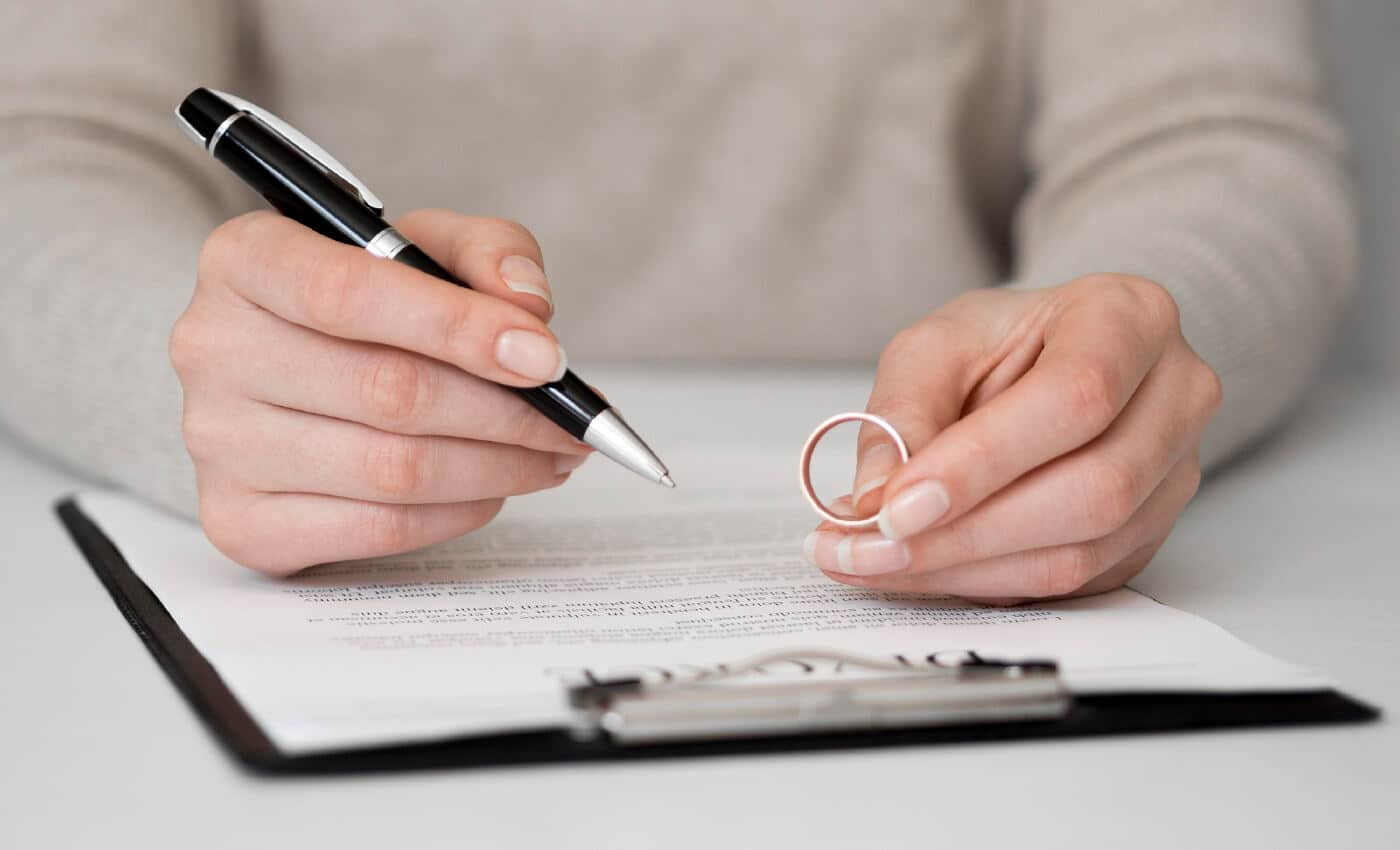When going through the emotional and often stressful period of getting divorced, the last thing you want is to be left feeling confused by complex legal jargon.
Luckily, the experienced team of divorce and family law solicitors here at Freeman Jones Legal can help you to understand even the most baffling of legal language.
Below, we explore the meaning of a Form E for divorce, explaining why this form is so important, when it should be completed, and whether it’s a mandatory part of getting divorced.
We also provide comprehensive yet detailed answers to a variety of frequently asked questions surrounding divorce Form E.
Regardless of whether you require a helping hand to get the process started or a skilled team of family law solicitors to help you reach a fair financial settlement, we’re eager to hear from you.
We can provide you with everything from a Form E divorce example to the latest rules and essential information regarding Form E divorce in the UK.
What is a Form E in a divorce?
Form E in divorce is simply a legal document that lists your financial details, like your capital, income, earning potential, and pension information.
Also referred to as a financial statement, it incorporates your financial needs as well as those of your children. These forms must be signed by both parties (you and your ex-partner) under the ‘statement of truth’ section.
Is Form E compulsory in divorce?
No, a Form E is not a compulsory part of getting a divorce. In fact, many divorcing couples are able to come to an agreement themselves through either mediation or negotiation.
However, in the event that you and your ex-partner cannot come to a mutual agreement surrounding your financial settlement, you’ll need to fill in and submit a Form E.
If you refuse to fill in a Form E for divorce when ordered to do so by the court, you can face significant and serious penalties, including substantial fines and even prison.
As a result, while filling in a Form E isn’t always a necessary part of getting divorced, it is a mandatory stage of obtaining a divorce through a court in England or Wales.
Who must submit Form E?
If you are required to go to court in England or Wales to come to a financial divorce settlement with your ex-spouse or civil partner, you must submit a Form E.
A Form E must be submitted by both parties to ensure the judge and any other concerned parties, like your solicitor, can gain a clear understanding of your own and your ex-partner’s financial affairs.
When should a divorce Form E be completed?
A Form E for divorce should be completed at least 35 days before your first court hearing (also referred to as your first appointment).
Depending on the complexity of the case, there may be several more court hearings before an agreement is reached and approved by the judge.
Where to find a Form E divorce example?
If you’d like to see a blank divorce Form E to use as an example, you can find the relevant form with ease online under the heading ‘Financial statement for a financial order (Matrimonial Causes Act 1973 / Civil Partnership Act 2004) / for financial relief after an overseas divorce etc: Form E’.
Seeing the layout and extent of the questions can also help you to find and prepare the relevant financial information ready for when you begin filling in the form.
How to fill in your financial statement (Form E)
Once you’ve located the form, you can begin filling in the financial statement to the best of your ability.
If you don’t have all the required financial information to hand, but will be able to access it at a later date, you can write ‘to follow’ where necessary.
Seek legal advice
On the first page of the form, you’ll notice that it states: “If you are in doubt about how to complete any part of this form you should seek legal advice.”
Due to the significance of this E Form in divorce and the serious penalties that can arise if you fill it out incorrectly, we always recommend our clients seek professional legal guidance from an experienced family law firm first.
Case details
First and foremost, you’ll be asked to provide the basic case details including the name of the court, applicant, respondent, and case number. You will have been sent your case number following your initial divorce application regardless of whether you applied as a sole applicant or with your ex-partner.
General Information
Then, you’ll need to fill in a ‘General Information’ section which includes all your basic contact and personal information such as your occupation, date of birth, and any children you might have.
Financial Details: Capital
You’ll then move onto the Financial Details: Capital section.
This includes part one (Real Property (land and buildings) and Personal Assets), two (Capital: Liabilities and Capital Gains Tax), three (Capital: Business assets and directorships), four (Capital: Pensions and Pension Protection Fund (PPF) Compensation), and five (Capital: Other assets).
Financial Details: Income
Next, your income will be assessed as your asked to complete sections six (Income: Earned income from employment), seven (Income: Income from self-employment or partnership), eight (Income: Income from investments e.g. dividends, interest or rental income), nine (Income: Income from state benefits (including state pension and child benefit)), and ten (Income: Any other income).
Financial Details: Summaries
As the name suggests, this small section simply asks for a summary of the overall value of your liabilities deducted from the overall value of your assets.
Financial Requirements
You must fill in both part one (Income needs) and part two (Capital needs) of this section, detailing the reasonable financial needs of yourself and any children that either live with you or are provided for by yourself.
Other Information
This section asks whether you have had (or expect to have) a significant change to your assets or income in either the last 12 months or within the upcoming 12 months. It also gives you an opportunity to mention any bad behaviour by the other party and whether you’ve made any significant contributions to family property, assets, outgoings, or welfare.
Order Sought
Here, you’ll be asked to indicate as to the type of order you want to obtain/your desired outcome of the court hearing.
Statement of Truth
This section simply asks you to sign your name in order to confirm that all the information you’ve completed in the form is “full, frank, clear and accurate” to your knowledge.
Schedule of Documents to accompany Form E
Finally, you’ll need to indicate which documents you have attached to your completed Form E by ticking the appropriate box on the Schedule of Documents to accompany Form E list.
Do I need a solicitor to complete Form E?
No, you don’t need a solicitor to complete Form E. However, completing this legal document with a solicitor on hand can help you ensure it’s filled out accurately and to the best of your ability. A solicitor can explain any technical legal language and provide expert advice, helping you to avoid filling out the form incorrectly.
Furthermore, you’ll also need a good solicitor to take a look at your ex-partner’s completed Form E, too. They should be able to spot any financial irregularities with ease, helping you to raise any areas of suspicion regarding their income or undisclosed assets, for example, during court proceedings.
Does Form E go to court?
Yes, Form E for divorce does go to court. It’s only ever required when your divorce case requires court intervention to help determine the division of assets. This means both your own and your ex-partner’s Form E will be presented before a judge and assessed.
What happens if a spouse refuses to complete Form E?
If your ex-spouse is purposely trying to make the divorce process more difficult or is generally being uncooperative when it comes to completing Form E, there are certain steps you can take.
First, you should contact the court and inform them of your ex-partner’s refusal to fill in the form.
From here, the court may decide to issue a costs order against the uncooperative spouse which could instruct them to pay for part or all of your court proceeding costs.
Typically, this provides enough financial motivation to encourage the problematic party to cooperate and complete the form because further refusal can lead to serious consequences.
What is the penalty for not submitting Form E?
Though completing a Form E can be notoriously difficult and a time-consuming process, not completing it could lead to far bigger problems.
If you, or your partner, opt not to fill in and submit Form E following a court order, you could face serious consequences.
Initially, you may receive a fine. However, the longer you avoid completing and submitting the form, the more serious the penalty becomes to the extent that you may face prison. Repeated refusal to comply with these court orders often leads to imprisonment in the UK.
Similarly, you may also face penalties if you decide to submit the form without completing it properly, or if you fail to complete the form at least 35 days before your first court hearing.
Purposely leaving out important financial information can be even more unhelpful and disruptive than not submitting the form at all.
What happens if someone lies on their Form E?
It’s important to note that part of the filling out Form E requires you to sign a statement of truth.
Both spouses therefore have a duty to provide full and honest disclosure regarding their finances. As a result, if you decide to deliberately lie when filling in the Form E, you could face significant consequences.
This is because lying on your Form E is considered contempt of court under the 2006 Fraud Act and is therefore punishable by either imprisonment or a fine.
We always recommend sourcing up to date information and never attempting to hide important and relevant financial information.
How many months of bank statements are required for Form E?
You should provide 12 months of bank statements when filling in your Form E.
Copies of statement from each bank account you hold or have held for the last 12 months (including those that are overdrawn) should also be included to allow the court to build a clear picture of your current financial situation.
What happens after Form E in a divorce?
Once the Form E has been completed and exchanged, a number of dispute resolution hearings will be held to encourage an agreement.
Often, however, a Form E is submitted when the parties cannot come to a mutual agreement.
This results in a final hearing, held before a judge who will determine a variety of important financial decisions like the division of assets.
Once the judge has approved of the settlement, it will become legally binding.
Seeking expert Form E support?
At Freeman Jones Legal, we like to make things simple so you can settle as quickly as possible.
Instead of overwhelming you with legal jargon like ‘Form E’ and ‘mesher orders’, we break everything down into easy-to-understand terms that make sorting out your financial affairs during a divorce both faster and fuss-free.
We have extensive experience supporting our clients across a range of topics within family law.
This includes everything from child custody arrangements to financial divorce settlements, and cohabitation disputes. Rest assured, we can help you to come to a fair an agreeable solution.
Our team of experienced divorce solicitors can help you to draft a financial settlement following divorce using dispute resolution methods, mediation, or skilled negotiation.
If none of these help you and your ex-partner to come to an agreement regarding your financial affairs, we can support you through court proceedings until your settlement is approved.
One of the leading law firms in Chester, you also can visit us in Wrexham, Liverpool, Warrington and North Wales.
To find out more about our services, simply visit one of our offices from across the UK or get in touch via phone, email, or online contact form.
However you decide to get in contact with our expert team, we hope to hear from you soon, so we can arrange a free 30-minute consultation.
Alternatively, feel free to take a look at our prices if you’d like to find out more about the cost of hiring a divorce solicitor.
Related from Freeman Jones Solicitors






